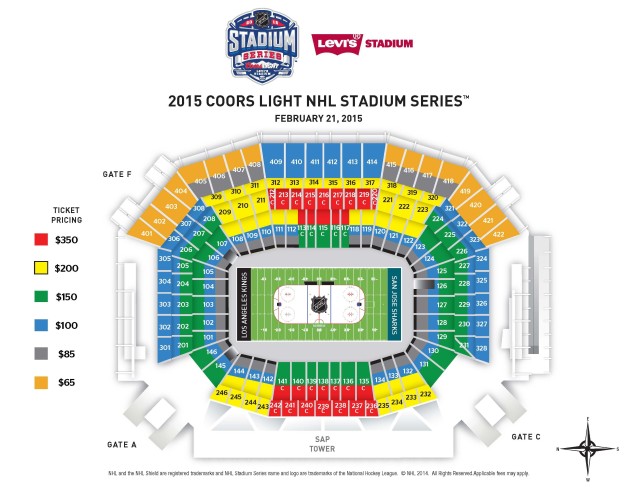
to adjust prices on about 2,000 outfield seats at AT&T Park. In 2009, the Giants went a step further, becoming the first to use technology from Austin, Texas, startup Qcue Inc. The Giants and most major league teams already employ a variable pricing plan, setting prices months in advance to reflect factors such as the drawing power of the opponent and whether it's a weekend game. "They're the guinea pigs not only for baseball, but for all sports." "Everyone's watching what the Giants are doing," Drayer said. It's got a chance, but the education process with that model is a little more difficult."ĭrayer, a former marketing and promotions employee for the Oakland A's, said the "dynamic pricing" formula the Giants are using this season could spread quickly. "But I don't think it's a disservice to fans.
#HP PAVILION SEATING CHART SHARKS 3D GENERATOR#
"The model isn't there to be a great benefit to fans, it's there to be a revenue generator for the team," Drayer said. Joris Drayer, a professor of sports management at the University of Memphis, said OptionIt could catch on only if fans "understand what they're getting and what they're not getting."

"There's no cost to us and it's another avenue for people who want to purchase tickets." "We typically don't do things first, but this was actually easy to do," Bordelon said. The team might consider option plans for other arena events, such as the SAP Open tennis tournament or mixed martial arts matches. Malcolm Bordelon, Sharks executive vice president of operations, said the team will evaluate OptionIt after the season, but is generally pleased with the results. Some of the options come with extras, such as a ride on the Zamboni machine or the chance to meet a player. OptionIt has similar deals with the NHL's Washington Capitals, the NBA's Boston Celtics and the NFL's Baltimore Ravens. OptionIt could be valuable, for example, for a fan planning in November to go to a regular season game in February, but not absolutely certain he or she can attend, said Mark Mastalir, chief executive officer. This week, tickets to G1 of the conference finals were offered on StubHub for $1,212 each, according to, a new site that tracks and forecasts the prices of tickets on secondary markets. The alternative would be to pay more to brokers on secondary markets like eBay or StubHub. If the Sharks lose to the Chicago Blackhawks in the Western Conference Finals, she loses the $114. Obviously, it would be a once-in-a-lifetime opportunity."


"They thought it was crazy that I paid $114 because they thought there was no way the Sharks would make it to the Stanley Cup Finals. "All my friends were skeptical," said Welker, who exercised that option on Monday. She figured those tickets would be nearly impossible to find at face value if the Sharks made it to the NHL's championship round. Sharks fan Jessica Welker of San Jose paid $114 in November for the option on a pair of tickets to what would be the franchise's first-ever Stanley Cup Finals home game. The Sharks, which receive a cut of the option price, offered 20 tickets per game during the regular season and playoffs, a sliver of the HP Pavilion's seating capacity of 17,562 for hockey. The buyer can later exercise that option or sell it to another buyer. Now, the Giants and Sharks are experimenting with pricing methods that other teams and event promoters are watching closely.įor this season, the Sharks teamed up with OptionIt, a Portland, Ore., startup, that sells options to buy tickets for future games at face value. But in the past decade, the Giants and other teams helped usher in an era of "variable pricing," which valued tickets using other factors such as the drawing power of the opposing team and whether the game was on a weekend or weekday. Years ago, tickets to sporting events and other forms of live entertainment were simply priced by location - the closer to the field, ice or ring, the higher the price.


 0 kommentar(er)
0 kommentar(er)
